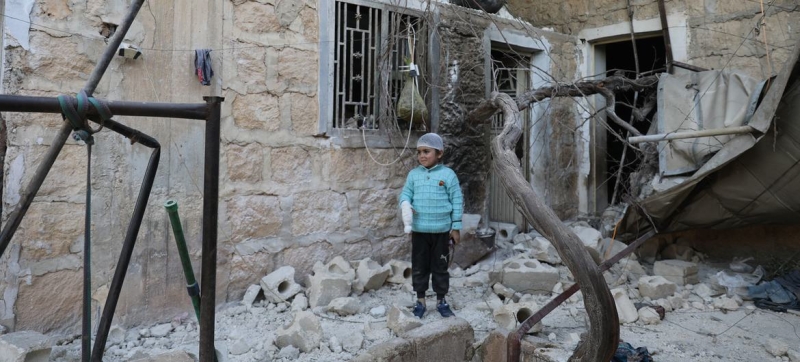
The effects of the 2023 earthquake continue to affect Syrian children. Photo from the archive. UN Special Envoy: Syria is feeling the consequences of the regional conflict Peace and Security
The situation in Syria is of grave concern, and in February the world community witnessed further “side effects” of the regional conflict. This was stated at a meeting of the UN Security Council by the UN Secretary General’s Special Envoy for Syria, Geir Pedersen.
“Numerous airstrikes attributed to Israel, including on residential areas of Homs and Damascus, have reportedly caused both civilian and military casualties, including among advisers from the Iranian Islamic Revolutionary Guard Corps. In some cases, Israel confirmed that it carried out airstrikes that it said were in response to ongoing rocket attacks on the occupied Syrian Golan from southern Syria,” Pedersen said.
He also recalled that the United States launched strikes in Syria and Iraq in response to a drone attack on a US post in Jordan near the border with Syria. The US has said Iranian-backed groups were behind this and other attacks on its bases, but Iran denies this. US officials said the strikes hit dozens of Iranian-linked targets in Syria and Iraq, with Syrian state media reporting casualties among both military and civilians.
Meanwhile, the Syrian conflict itself continues, and it is mainly what leads to civilian casualties and displacement of civilians, Pedersen emphasized.
“This month, the entire north of the country, home to millions of civilians, has witnessed numerous frontline firefights, artillery, rocket and sniper attacks, as well as pro-government drone strikes and strikes HTS drones (“Hayat Tahrir al-Sham” – editor’s note), as well as Turkish drone strikes,” Pedersen said.
He noted the increase in the number of ISIS attacks, especially in the central and northeastern regions, as well as the unstable situation in the southern regions of the country.
The Special Envoy stated the need to reduce tensions in the region and, first of all, to immediately introduce a humanitarian ceasefire in the Gaza Strip, which the UN Secretary-General has repeatedly called for.
“We also clearly need urgent de-escalation within Syria, building on existing ceasefire agreements and aimed at a nationwide ceasefire in accordance with resolution 2254. Civilians and civilian infrastructure must be protected,” Pedersen said.
Earthquake Anniversary
This month It is one year since the catastrophic earthquakes that occurred in Turkey and Syria in February 2023, UN Emergency Relief Coordinator Martin Griffiths reminded Security Council members.
“Thanks to significant support from the international community, emergency assistance has been provided, including first aid, food and protection assistance and shelter assistance,” Griffiths said.
He added that in Syria, where the conflict has continued for almost 13 years, much remains to be done to overcome the long-term humanitarian consequences of the earthquakes. It is necessary, in particular, to ensure the full restoration of basic services and provide the affected population with adequate temporary housing.
Griffiths also recalled the broader humanitarian crisis in Syria. “The humanitarian outlook for Syria remains grim in 2024,” he said.
16.7 million people in the country – almost three quarters of the population – need humanitarian assistance, including food and drinking water. The fighting has damaged critical infrastructure, including water stations, medical centers and schools. More than a million people were reportedly left without electricity. At the same time, humanitarian organizations are finding it difficult to deliver aid, including due to security concerns.
“I welcome the Syrian government’s decision earlier this month to extend the three months, until May 13, 2024, authorization for the UN to use the Bab al-Salam and Al-Rai crossings for the delivery of humanitarian aid,” Griffiths said.
In January, Syrian authorities also extended permission to use the Bab al-Hawa border crossing to deliver aid to northwestern Syria for another six months, until July 13, 2024.
“In 2023, more than 5,000 trucks from the UN and its humanitarian partners passed through these crossings. Already in 2024, we have carried out more than 40 cross-border missions. This has enabled us to provide essential care to 2.5 million people and carry out more than a million medical procedures every month,” Griffiths said.
“We continue to advocate for humanitarian workers to be given the space they need to make decisions about the fastest and most effective way to deliver aid to those who desperately need it, without excessive politicization of such decisions,” he added.
